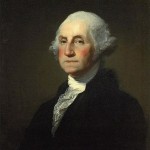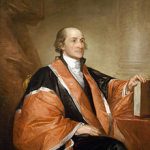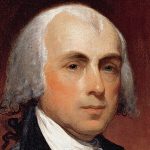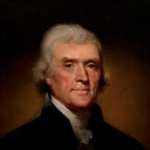
 After the Revolutionary War, and the United States independence that followed, the relationship between the two nations was quite strained. The United States did not like having British military posts on our northern and western borders, and Britain’s violation of American neutrality in 1794 when the Royal Navy seized American ships in the West Indies during England’s war with France. Finally, in an attempt to smooth things over, Supreme Court Chief Justice John Jay, who was appointed by President Washington, came up with a treaty. The treaty officially known as the “Treaty of Amity Commerce and Navigation, between His Britannic Majesty; and The United States of America” was signed by Britain’s King George III on November 19, 1794 in London. However, after Jay returned home with news of the treaty’s signing, President Washington, who was now in his second term, had encountered fierce Congressional opposition to the treaty. By 1795, its ratification was still uncertain, and there was work to be done to change things.
After the Revolutionary War, and the United States independence that followed, the relationship between the two nations was quite strained. The United States did not like having British military posts on our northern and western borders, and Britain’s violation of American neutrality in 1794 when the Royal Navy seized American ships in the West Indies during England’s war with France. Finally, in an attempt to smooth things over, Supreme Court Chief Justice John Jay, who was appointed by President Washington, came up with a treaty. The treaty officially known as the “Treaty of Amity Commerce and Navigation, between His Britannic Majesty; and The United States of America” was signed by Britain’s King George III on November 19, 1794 in London. However, after Jay returned home with news of the treaty’s signing, President Washington, who was now in his second term, had encountered fierce Congressional opposition to the treaty. By 1795, its ratification was still uncertain, and there was work to be done to change things.
The two biggest opponents to the treaty were two future presidents…Thomas Jefferson and James Madison. Jefferson was, at the time, in between political positions. He had just completed a term as Washington’s secretary of state from 1789 to 1793 and had not yet become John Adams’ vice president. Fellow Virginian, James Madison was a member of the House of Representatives. Jefferson, Madison and other opponents feared the treaty gave too many concessions to the British. They argued that Jay’s negotiations actually weakened American trade rights and complained that it committed the United States to paying pre-revolutionary debts to English merchants. Washington himself was not completely satisfied with the treaty, but considered preventing another war with America’s former colonial master a priority.
The treaty was finally approved by Congress on August 14, 1795, with exactly the two-thirds majority it needed 
 to pass. President Washington signed the treaty just four days later, on August 18, 1795. Washington and Jay may have won the legislative battle and averted war temporarily, but it created a conflict at home that highlighted a deepening division between those of different political ideologies in Washington DC, much like what we see these days. Jefferson and Madison mistrusted Washington’s attachment to maintaining friendly relations with England over revolutionary France, who would have welcomed the United States as a partner in an expanded war against England.
to pass. President Washington signed the treaty just four days later, on August 18, 1795. Washington and Jay may have won the legislative battle and averted war temporarily, but it created a conflict at home that highlighted a deepening division between those of different political ideologies in Washington DC, much like what we see these days. Jefferson and Madison mistrusted Washington’s attachment to maintaining friendly relations with England over revolutionary France, who would have welcomed the United States as a partner in an expanded war against England.


Leave a Reply